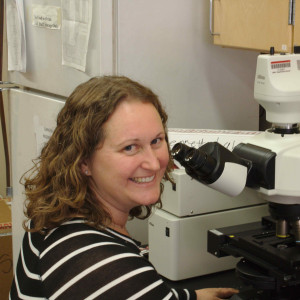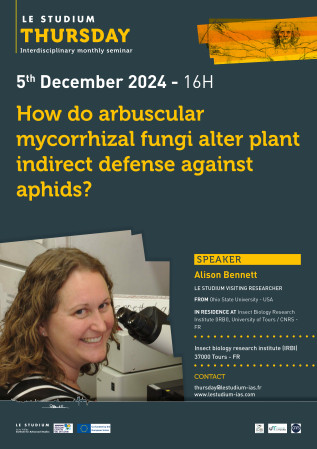Alison Bennett

From
In residence at
Insect Biology Research Institute (IRBI), University of Tours / CNRS - FR
Host scientist
David Giron
BIOGRAPHY
Alison Bennett has more than 20 years experience researching ecological and evolutionary interactions between soil microbial communities, plants, and arthropods. Currently she is an Associate Professor in the Department of Evolution, Ecology, and Organismal Biology at the Ohio State University. Work in her group addresses three main research areas: 1) Species interactions involving microbes, 2) Microbial traits, and 3) Evolution within microbiomes. Research conducted in this fellowship falls within the first research area. Dr. Bennett’s group conducts research and develops methods in these three main areas that answers both basic and applied questions by utilizing plant-soil microbe systems in annual and perennial systems as well as agriculture, restorations, and pristine natural environments. Working on both basic and applied questions allows them to address basic questions in easily manipulated applied systems as well as examine the intersection of both types of systems in order to improve broad understanding of ecological and evolutionary interactions. Dr. Bennett conducts much of her research via interdisciplinary collaborations involving researchers from multiple fields.
PROJECT
How do soil microbes influence plant attraction of insect herbivores and/or parasitoids of herbivores?
Plants are faced with a myriad of enemies, and, unlike many animals, they cannot run away from herbivores. However, plants don’t face these enemies alone—they get a bit of help from the beneficial soil microbes arbuscular mycorrhizal (AM) fungi. AM fungi aid uptake of important nutrients and water, and prime plants for faster immune responses against pathogens and herbivores. Most research has focused on immune priming by AM fungi of jasmonate mediated signaling which promotes direct and indirect defenses in plants against chewing herbivores. However, the focus of this research field on chewing herbivores has prevented us from understanding potential impacts of priming on sap-feeding herbivores like aphids. Our preliminary data shows that that AM fungal communities alter aphid parasite success on potato plants, and plants hosting AM fungi are more attractive to aphid parasitoids than plants without AM fungi. This has led us to hypothesize that AM fungi promote indirect defense (calling to herbivore enemies or promoting herbivore enemy fitness) when fed on by sap-feeding herbivores. Unfortunately, to date, we have lacked the resources to truly answer the question of whether AM fungi alter aphid feeding and parasitoid attraction through physiological changes. The unique combination of resources at IRBI would allow us to address these questions. Here I aim to address, in collaboration with colleagues at IRBI and collaborators Ali Karley (James Hutton Institute, UK) and Maria J. Pozo (CSIC, ES) whether AM fungi promote priming of indirect defenses (e.g., volatiles) in response to sucking herbivores. We hypothesize: 1) AM fungi promote indirect defense when fed on by aphids. 2) AM fungi alter aphid probing on host plants, but aphid probing behavior also varies with plant species. In addition to completing an experiment to address this gap we will gather researchers interested in plant-arthropod-microbe interactions to attend a conference focused on plant-arthropod-microbe interactions. We believe this novel project will shift our understanding of how AM fungi promote immune priming with concomitant effects for the use of AM fungi in sustainable agriculture.

